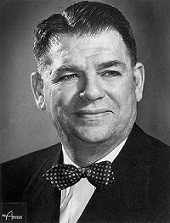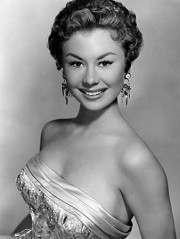The Music Man
Oscar Hammerstein (1895-1960) was one of the most successful songwriters in the history of the Broadway musical. He partnered with the composers Jerome Kern and then, famously, Richard Rodgers to write some of Broadway's greatest musical plays. He set a very high bar for himself. "There is no such thing as a bad audience," he would say, "only a bad play". He liked to quip that the number of people who will not go to a show that they do not want to see is unlimited. He wrote exquisite love songs, hilarious comic songs, and everything in between. Every so often he wrote a song of a more serious nature. I'd like to focus on three and conclude by tying them together.
Left: Hammerstein ...composed the lyrics to exquisite love songs. Middle: Mitzi Gaynor who starred in the film version of South Pacific. Right: The Oscar Hammerstein hit The Sound of Music starred Julie Andrews.
Hammerstein, in collaboration with Jerome Kern, wrote the song "Old Man River" for the musical play Showboat in 1927. For a long time I thought it was a song of praise for the Mississippi River that, generation after generation, "just keeps rolling along". I was wrong. In fact, Old Man River expresses disapproval of the river for its indifference to the plight of those that live and work along its banks, primarily the black people. The implication of the song is that this indifference is not confined to the river but afflicts society as a whole. In the play, it is a chorus of black dock workers who sing the song. The last two lines are especially moving as they make reference to the Jordan River, a more "compassionate" river in the imagination of the black workers than the Mississippi.
Let me go 'way from the Mississippi,
Let me go 'way from the white man boss,
Show me that stream called the River Jordan.
That's the old stream that I want to cross.
The musical play South Pacific premiered in New York in 1947. It was written in collaboration with Richard Rodgers. The plot centers on an American army nurse stationed on an island in the Pacific during World War II. She falls in love with a widower, a middle-aged French expatriate plantation owner, but finds it difficult to accept his mixed-race children from his first marriage. In a subplot, an American army lieutenant falls in love with a young native island woman, but worries what others will think should he marry her. It is the lieutenant, recalling his own upbringing in America, who sings "You've Got to be Carefully Taught".
You've got to be taught to hate and fear,
You've got to be taught from year to year,
It's got to be drummed in your dear little ear,
You've got to be carefully taught.
There is artistry in this song. The word "dear," which often evokes the innocence of childhood, is here used to suggest the subversion of that innocence. The word "carefully" emphasizes the fact that undermining that innocence is very often done with malice aforethought.
Rodgers and Hammerstein wrote the musical play The Sound of Music in 1959. The song "Climb Every Mountain" needs to be understood in the context of the play. Standing alone, the song can mean too many things and seems superficial. But in the context of the play it conveys an important life lesson. Maria is a young postulant at Nonnberg Abbey, in Austria. Full of life, she is unlike the other postulants and nuns at the Abbey. The Mother Abbess concludes that she is not yet ready for the religious life. She sends her to serve as a temporary governess of the children of Captain von Trapp, a retired officer of the Austrian navy, and a widower. Maria captures the children's hearts and also falls in love with the Captain. Returning to the Abbey in distress, she asks the Mother Abbess what she should do. It is the Mother Abbess who sings "Climb Every Mountain". The Abbess tells Maria that in life we must follow our heart and go where love leads us. And that is what Maria does.
Climb every mountain,
Ford every stream,
Follow every rainbow,
Till you find your dream.
Following our heart, and trusting it, is a central theme of Oscar Hammerstein's work. In his eyes it is the corrective to the indifference of Old Man River, the remedy, if one exists, to the prejudice of "You've Got to be Carefully Taught". People go to the musical theater to be entertained; it is an extra benefit if they are uplifted too. Oscar Hammerstein understood this and made it a hallmark of his work.
Oscar Hammerstein died on August 25, 1960. As people say, a light went out on Broadway. A few evenings later, in tribute to his memory and in recognition of his contribution to the American musical theater, at 8pm all the lights of all the theaters on Broadway were turned off for three minutes.











Comments